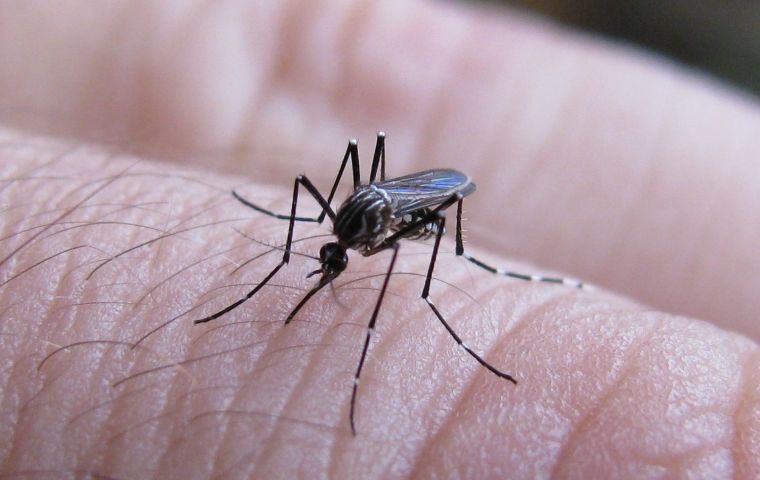
BUENOS AIRES, Jan 7 (NNN-MERCOPRESS) — Health authorities in the Argentine province of Corrientes (northeast) confirmed the death of a patient who had tested positive for dengue, thus increasing the number of fatalities to three this summer.
The 42-year-old victim had been admitted to the Hospital de Campaña Escuela Hogar “in critical condition, with a dehydration condition due to the evolution of the disease, and who had previously been hospitalized in a private clinic,” the provincial Epidemiology Directorate said in a statement.
There are currently 153 active cases in the province, the agency also explained.
For dengue to be suspected, a person must have a fever coupled with one or more of the following symptoms: severe headache, pain behind the eyes, muscle and joint pain, nausea and vomiting, itching and/or bleeding of the nose and gums, intense tiredness or skin rash. The experts also warned against the use of painkillers such as ibuprofen and advised people to seek medical help urgently, in addition to eliminating mosquito breeding places, avoiding water accumulation, and other sanitary measures.
Last year, 71 dengue-positive deaths were reported nationwide, of which seven took place in the country’s northeast and one in the province of Corrientes. The highest mortality rate was recorded among people over 80 years of age. Argentina recorded 135,676 cases of dengue in 2023. The country is currently in a state of high alert due to an invasion of Aedes aegypti, the mosquito responsible for transmitting dengue fever.
According to Argentine authorities, the peak of transmission is in the Buenos Aires region, where intensive measures are being taken to contain the spread of the disease. The Health Ministry launched an awareness campaign with guidelines for the population to adopt preventive measures, such as the use of repellents.
The number of transmitting mosquitoes has increased even more in the last four weeks, which is causing concern, especially in public areas such as parks and squares.
Although the predominant species in the country is Aedes aegypti, Argentina is also facing health challenges with the invasion of Aedes albifasciatus, known as the “flood mosquito”. The recent floods and rains that have hit the country have led to an explosion in the number of insects, present in wild environments, having a cycle influenced by the rains, which is currently resulting in a greater number of adult mosquitoes. Although similar in shape, Aedes albifasciatus does not transmit dengue.
The current situation has led to an increase in demand for protective products, such as repellents, creams, and citronella essential oils, with retail prices skyrocketing overnight.
In neighboring Paraguay, children aged 5 to 14 account for the highest percentage of hospitalizations. In the last three weeks of 2023, 410 people were hospitalized with dengue, 20 of them in intensive care units. Paraguay’s Health Ministry (MSP) also said 61% of those admitted were female. Those hospitalized for dengue, both adults and children, have underlying diseases such as heart disease, chronic lung disease, diabetes, obesity, and others. Even pregnant women required hospitalization. In the last three weeks of 2023, 3,512 cases of dengue were identified nationwide. Fatal cases from October to December amounted to 15, of which 5 were aged between 1 month and 4 years.
Paraguay’s Deputy Health Minister José Ortellado spoke of one daily death in 2024. Health authorities have set up a “situation room” to monitor the crisis.
Health facilities nationwide are admitting an increasing number of patients with dengue and also with Covid-19, it was reported. “Given the boom in travel during the high season, the potential importation of DEN-3 is very high. For this serotype, the entire national population is susceptible. The same for Covid-19, there is a high possibility of introduction of non-circulating variants in the country,” the MSP said in a statement.
”We have 8,000 consultations per week, the number is doubling. We have 15 deaths (in the endemic period, that is, since October). We still have to close five cases to have the total number. Since the beginning of the year, we have registered 4 deaths, that of a girl in Caacupé, an adolescent in Ciudad del Este, another case in San Lorenzo, and one more in Encarnación,” Ortellado pointed out while admitting further testing was still needed to fully confirm each case. — NNN-MERCOPRESS





